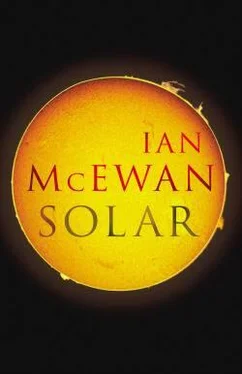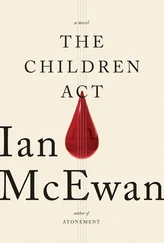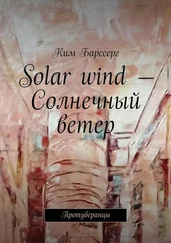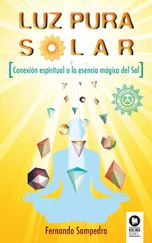He had reached the place where the amorphous overlapping ten queues narrowed down to three in order to line up for the immigration desks. And here he came, a gaunt parchment-faced fellow in a loden coat (Beard had always despised the style), sliding in from the left, trying to use his height to squirm ahead, angling his oversized briefcase at knee height to use as a wedge. Abruptly, driven by shameless rectitude, Beard stepped forward to deny the man space, and felt the briefcase bang against his knee. At that moment Beard turned and sought out his gaze and said politely, though his heart beat a little harder, 'Terribly sorry.'
A rebuke poorly disguised as an apology, pretending manners to a man he would rather at that moment kill. It was good to be back in England.
But looking into the man's face revealed just how ancient a cheat this was. Eighty-five at least, with sepia liver spots from papery forehead to puckered throat, and an air of slack-jawed vacancy, and pendulous lower lip faintly trembling and wet. Of course, the old had to get ahead. They had less time. They were almost dead. Their hurry was greater than his, and forgiveness, even an apology, was in order. But the old man had faded away, fallen back somewhere behind, out of sight, in disgrace. Too late to offer him a favourable place in the queue.
And so it was that Beard, heartless scourge of the frail, appeared before an official somewhat chastened, loathing himself a little and therefore not so surprised that his photograph or his height, his date of birth or his next of kin should be the cause of suspicion and a degree of expert frowning. The official snapped the pages of his passport in rapid sequence, glanced at Beard, flipped them back, then, following a moment's consideration, set the document face down on a scanner. She was in her late twenties, possibly less than half his age. Parents' country of origin he guessed to be Ethiopia. If she slid off her high stool now, stepped down from her station and kicked off her high heels, she would still stand six inches taller than him.
He was rotund, slow-moving, pinkly hot – and late. She was sleekly attuned to her current task, guarding the portals of her nation against undesirables. He watched her as she stared at his details on her screen, as her right hand, faintly purplish about the palm, fluttered insouciantly across her keyboard in pursuit of some other angle on him, a deeper perspective, he suddenly hoped. From the high internal scaffolding of the immigration hall a silence appeared to descend like thickening snow, a delicious chill, and all sense of hurry left him. This fine-textured, light-absorbent, light-loving skin, these high-pitched cheekbones (he saw only one) with a delicate dip and sculpted curve, these brown eyes resting gravely on his case, this happy marriage, as he saw it, of intelligence and grace. Millennia ago, under cool canopies in some secret desert redoubt, the genes of a gazelle had entered the local human pool. Such a fantasy of miscegenation could be a form of racism or simple adoration, but either way he was in no mood to banish it. It lingered as he gazed at the black left hand and wrist, long and narrow like a salad tosser, resting inert by the foxed covers of his upturned passport.
He remained a bold fool in these matters – habits long fixed, not a crumb wiser than his twenty-five-year-old self, no prospects of improvement, so all his past wives agreed – and in the moments before she spoke he indulged the familiar notion of asking if the immigration officer was free for dinner. He asked many women, total strangers, to dinner, and not everyone said no. His involvement with Patrice had begun over such a feast, and set in train such disgraceful events, that even now, ten years on, he still remembered what he ordered. It predicted all that was to come, it was a curse: a skate with capers and burned butter, an over-salted salad of wild rocket, a yeasty Pinot Grigio, surely corked, and he too fatally entranced to call the sommelier across.
The young woman met his eye and said, 'You've travelled a lot in the Middle East.'
Her 'lot' was glottal, the statement intoned as a question. What linguists called uptalk, so he had recently learned. Lately he had become something of a language snob, an inverted language snob, whose age and limited connections prevented him from understanding much about accent and status in England these days. The year before, he had begun an affair with a London waitress whom he took to be the lively feral creature of some forsaken housing estate. But it turned out she had grown up in the Surrey Hills in a Lutyens house hidden among high laurels, and her father was an ennobled mathematician, a fellow member of the Royal Society. Beard had fled. Now here he was again, thrilling to his own idea of something demotic, or racy.
He said neutrally. 'Yes. that's right.'
'Libya. Egypt, Sudan. And the rest. Business is it?'
He nodded.
'And what is that?'
He had been asked many times at desks like this. He said, 'Energy consultant.'
'Is that oil?'
Again, the hint of the elided glottal tugged at something unwholesome in him.
'No. Solar.'
'CSP is it?'
Not quite right, but he nodded. She knew. In a dazed moment of virtuous hope and carnal self-interest, his imagination leap-frogged past dinner to the time when she had served out her notice with the immigration service and, smoothly competent, was travelling by his side, working with and for him, living for and with him and his vision of a world cleansed and cooled and energised by photovoltaics, by concentrated solar power, above all by his own artificial photosynthesis, and by systems centralised or distributed and grid-tied. He would teach her all he knew about thin film, heliostats, feed-in tariffs. She would be efficient in hours; out of them, generous, athletic, with low tastes.
He was starting to say conversationally, 'So you take an interest in €¦' as she spoke over him.
'Thank you, Mr Beard.' She was offering him his passport with her right hand, reaching over her neglected left where it lay unmoving on the desk. Of course! Unusable, wasted, withered. His ridiculous fantasy surged further, swelling into protective, nurturing affection for her congenitally useless left arm. She would eat dinner with a fork in her right hand; naturally, he would do the same.
His invitation was on his lips as her gaze slipped from his face towards the head of the queue behind, her smile fading as she called, 'Next.'
This was the weakness he had to live with, his own withered arm, the mental playlets, wholly infantile, that generally led nowhere, occasionally brought him trouble and only very rarely joy. But similar daydreams – manic moments, brief neural bursts, compacted but cloudy episodes that braided the actual with the unreal, and threaded gaudy beads of the impossible, the outrageous and contradictory along thought-lines of indeterminate logic – had long ago brought him to formulate his Conflation. The poetic, the scientific, the erotic – why should the imagination care which master it served?
He hurried across baggage reclaim, past the creaking carousels and bored crowds beneath the information screens, through deserted customs, past the sinister one-way glass and the stainless-steel examination tables like bare mortuary slabs, then out along the lines of dead-eyed drivers and their boards – Kuwait Balloon Adventures, Bishop Dolan, Ted of Mr Kipling – and crossed the departure hall, fully aware that he was not quite making a direct line to the stairs that led down to his train, nor was he quite aiming for the down-at-heel airport shop that sold newspapers, luggage straps and related clutter. Was he going to be weak and go in there as he always did? He thought not. But his route was bending that way. He was a public intellectual of a sort, he needed to be informed, and it was natural that he should buy a newspaper, however pressed for time. At moments of important decision-making, the mind could be considered as a parliament, a debating chamber. Different factions contended, short- and long-term interests were entrenched in mutual loathing. Not only were motions tabled and opposed, certain proposals were aired in order to mask others. Sessions could be devious as well as stormy.
Читать дальше












